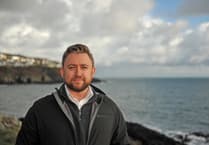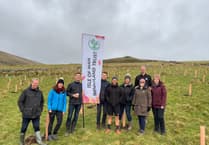In today’s global landscape, sustainability has transitioned from a niche interest to a top priority for businesses worldwide. We had the opportunity to sit down with Everitt Newton, an advisory manager at PwC Isle of Man, whose passion for the environment has evolved into a thriving career. Specialising in sustainability and climate change solutions, Everitt joined the professional services firm in September 2023 and offers advisory services on environmental issues, social responsibilities, and corporate governance (ESG), assisting clients in addressing the pressing challenges of climate change in our rapidly evolving world.
From net zero and decarbonisation to climate adaptation and risk, Everitt guides companies through the complexities of sustainability reporting, recognising that each organisation’s environmental impact is unique, requiring tailored solutions. ‘Our job is to evaluate their current efforts and help them develop a comprehensive plan,’ Everitt explains. ‘Whether it’s reducing emissions or transitioning to increased operational efficiencies, we aim to bridge the gap between intention and action, ensuring alignment with ambitious decarbonisation targets.’
Despite the absence of specific regulations in the Isle of Man, the international business community faces a complex landscape of sustainability reporting. Everitt’s experience is invaluable in navigating this space and preparing businesses for forthcoming local regulations. ‘Our goal is to help navigate existing frameworks and guidelines, empowering businesses to meet current and future regulatory requirements,’ he asserts.
With a career spanning New York and London, Everitt has witnessed the exponential growth in demand for ESG services. Recognising the importance of effective communication in driving change, Everitt emphasises the role of sustainability reporting in enhancing transparency and accountability. ‘Trust is fundamental in fostering strong connections between organisations and their stakeholders. Those who effectively communicate their sustainability initiatives tend to gain trust, leading to rewards in the form of stronger relationships and loyalty from employees, customers and stakeholders alike.’
PwC’s 27th Annual Global CEO Survey underscores the urgency of prioritising ESG initiatives, with CEOs and investors both acknowledging the critical impact of climate change on businesses. Upskilling and reskilling the workforce are crucial for fostering green skills and preparing for the jobs of the future. According to the survey, some CEOs might not be prioritising this as a climate action. This suggests a potential gap between recognising the importance of sustainable practices and implementing them in terms of workforce development. PwC, with its global network of expertise spanning 151 countries and more than 360,000 people, is at the forefront of this movement, leveraging local talent to drive global change.
The Isle of Man’s UNESCO biosphere status exemplifies its potential to influence global sustainability efforts. This status is a designation recognising areas committed to sustainable development, and it matters for the Isle of Man as it highlights the island's dedication to balancing conservation and socio-economic development for the benefit of both residents and the environment. Everitt and his team are proud members of PwC’s Centre for Nature Positive Business, advocating for a transition to a nature-positive impact. ‘Every business in some way is dependent on nature and being nature-positive is about businesses understanding their dependencies and impacts on it.’
As businesses set ambitious net-zero targets and brace for regulatory changes, Everitt and the Advisory team remain committed to guiding local firms towards defining their sustainable goals. ‘It’s not about having all the answers,’ he reflects, ‘it’s about understanding the objectives and collectively charting a course towards a sustainable future.’
In the next phase of this journey, awareness will transition to action, setting the stage for a transformative era of sustainable business practices. As Everitt aptly summarises, ‘The next five years are crucial. It’s time to set targets and hold organisations accountable for their sustainability commitments.’




